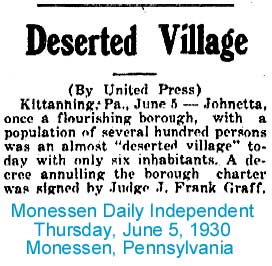| PittBuff.com | History & Genealogy of the Pittsburg Buffalo Company |
|
| JOHNETTA MINE & BRICK PLANT: 1899 Johnetta, PA |
| Johnetta was the home to both the United States Sewer Pipe Company and a vertical shaft coal mine. The town was named after the daughter of John H. Jones. The Johnetta Plant of the United States Sewer Pipe Company utilizes the famous Kittanning clay for the manufacture of refractory products. This clay immediately underlies the Kittanning coal, which is mined in advance of the clay, and which finds a ready market at the northern lake ports. The clay seam is about 15 feet in thickness, of exceptional purity, and adapted to the manufacture of pavers, high-grade face brick and sewer pipe.* The town of Johnetta, established in 1892, is located at one of the most beautiful points in the Allegheny valley, the houses being built on a high bluff overlooking the river. Each house is surrounded by a large plot of ground suitable for gardening, and fruit and shade trees have been planted along the streets. The town depends entirely upon the operations of the Pittsburgh-Buffalo Company controlled by the Jones interests, John H. Jones, president of the company, residing there all the year round. He is unusually popular with the employees and takes a strong personal interest in their welfare. The town consists of 140 frame houses, sixteen brick residences, a store, schoolhouse, and the Johnetta Memorial Church, presided over by Rev. Walter Kennedy. The houses are heated by gas taken from the company's own wells, which have a pressure of 80 pounds to the square inch. The population is 662, of which about 500 are employees of the company.*
The Johnetta place of the United States Sewer Pipe Company and the Johnetta mines are both located at Johnetta, Pa., thirty-three miles north of Pittsburgh on the Buffalo & Allegheny Valley division of the Pennsylvania railroad. These important industries bring prosperity to many residents of this section, the brick plant – which was established in 1898 – alone giving employment to from four hundred to four hundred and fifty men. This plant is the largest of its kind in the country, never closes, and turns out over one hundred thousand bricks daily, for which a market is found all over the United States and Canada.
 *Armstrong County, Pa., Her People, Past and Present, J. H. Beers & Co., 1914
|